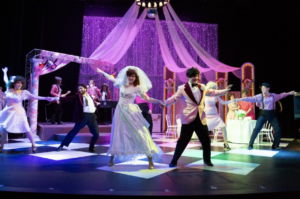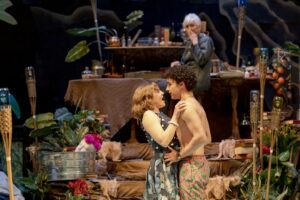
This week, the University of Cincinnati’s College Conservatory of Music’s Acting program opens their production of Emilia at the Patricia Corbett Theater. Emilia gives a rendition of the life and times of poet Emilia Bassano, featuring Emilia as the heroine of her own story rather than the muse of someone else’s.
The Story
In 1611 Emilia Bassano wrote a volume of radical, feminist and subversive poetry. It was one of the first published collections of poetry written by an English woman. The little we know of Emilia Bassano is restricted to the possibility that she may have been the ‘Dark Lady’ of Shakespeare’s Sonnets – and the rest of her story has been erased by history.
Morgan Lloyd Malcolm’s play Emilia won the 2020 Laurence Olivier Award. It assumes this connection with Shakespeare to be true in order to explore how history revered the man and hid the woman. We are still dealing with the fallout of such treatment centuries later.
Performances in CCM’s Emilia
Emilia, written for an all-female identifying cast, splits the title role into three women playing Emilia at different points in her life. Palini Sunkara begins as Emilia in her younger years, full of passion, ambition and nowhere near ready to fall in love. The spirit and genuine air Sunkara brings the role, breathes life into the three Emilia’s. Morgan Lloyd Malcolm does not claim this play to be an accurate retelling of history but instead presents “a memory, a dream, a feeling of her” Joysoline Ivory Smith portrays Emilia in the second part of her life.
Smith takes the forefront immediately following the loss of Emilia’s daughter. To be asked to jump into the spotlight in a moment of such heightened emotions is no small task, yet Smith seamlessly jumps into this memory and fills the stage with the grief and loss of yet another life Emilia had imagined for herself. Smith takes us through much of the second act of the play, showing Emilia finding herself again through the support of her fellow women. She regains her truth and becomes steadfast in her mission to give a voice to herself and so many silenced women like her.
“I will never be at peace as long as I have no voice. I will not stop. I will not rest until I find words for all my daughters I will never know” – Emilia

Themes
A resounding theme throughout this production is women supporting women. The 3 Emilia’s mirror this as they ask each other if they are ready to take centerstage. Emilia 3, played by Yodeet Nymberg, acts as a narrator throughout the story but takes the lead as Emilia finds her strongest voice yet. Nymberg brings a steely, mature voice to the poet. Nymberg addresses the crowd and we see a true leader.
We meet many men and women throughout the play who helped shape or steer the path Emilia takes. The first of note being Lord Carey, a man of court who is the first to see Emilia’s ambition and offer her the means to feed it. Carey, played by Kiki Hellerman is one of the first moments we dive deeper into the female identifying cast portraying male characters. Hellerman brings to life the arrogance of the men of court while giving a quiet sincerity to Carey when he speaks of ways to help Emilia in her journey. This, unfortunately, is squashed by his male ego and instilled views of women’s roles in society.
Emilia’s Circle
Carey leads us to meet Emilia’s husband, Alphonso, who this play suggests is in a marriage of convenience with Emilia – she needs a spouse to gain status, and he needs a wife to protect his secret homosexuality. Alphonso, played by Jaymiya Quarles, brings comedy to the story while shedding light on the simplicity of the male status and ego in this Tudor era.
We meet the women who Emilia later teaches to read and write; a colorful collection of women who work by the river and save Emilia from drowning. These women, Eve played by Gabrielle Mignonne, Hester played by Becca Anderson, Judith played by Kiki Hellerman, Mary played by Maria Leigh, and Flora played by Lauren Grammer bring a warmth and support that Emilia has not yet known in her life. This gives new meaning to her mission to have the voices of powerful and smart women heard.
Gabrielle Mignonne gives an endearing performance as Eve which is only elevated by her performance as Lord Howard moments earlier. Mignonne is able to flawlessly transition from the oppressive role of a high-class male who relentlessly works to shame and silence Emilia, to a spirited, unapologetic female student of Emilia who soon finds a voice that rivals Emilia’s own. The range shown by Mignonne gives power and a voice to so many women who have been silenced in the past.

We meet a variety of men and women of upper-class society who are scandalized at her poetry. Some of these include Mary Sidney, played by Becca Anderson. After bringing life to Emilia’s mother, Anderson re-enters in a contrasting role where she gives power, strength and a little bit of sass to Sidney.
Emilia and Shakespeare
We meet William Shakespeare, possibly the most well-known part of Emilia’s life. Shakespeare, played by J.J. Sanchez. This “dark lady”beguiles him, using her as inspiration for sonnets, and quite possibly using her name when penning Othello.
Will ultimately loses the love he feels for Emilia when “man-splaining” why she shouldn’t write or perhaps cannot be a writer in the same way a man can. The inner turmoil between Emilia’s love for a man who shares her passion, and her disdain for his ability to freely give it to the world, is showcased so purely by Sunkara. Sanchez, as Shakespeare, brings another layer to this “love’s labor lost” relationship. We are shown hopeful moments from Sanchez that Shakespeare may finally be the love Emilia has been waiting for. Yet, he ultimately falls victim to the male ambition and ego that plagues the citizens of Emilia’s time.
Production Leadership of CCM’s Emilia
Bridget Leak proudly leads the female identifying Artistic and Production team of Emilia. A lesser director might have gotten lost in the wordy book of this production, but Leak is able to pull out the moments that linger not only in the air of the theater but in the minds of audiences long after they leave their seats. The contrast of this mostly period correct dialogue with modern dance moments throughout this production parallel the themes that we see in todays political atmosphere.
This, along with the sound design of Kaitlin Barnett Proctor, furthers the plotlines of the 3 different souls and of those who are different being restricted and silenced. The repetition of words and noises such as “hush” and “shh” add yet another layer to the 3-tiered Emilia trying to navigate the many obstacles that keep her from releasing her voice. Not only are we fighting gender-based biases but also biases based off cultural differences, societal classes, and ethnicities. The underlying score paired with the syncopated pounding created by the actors’ bodies leaves audiences yearning for more.
The sounds fuse so effortlessly with the world of the play. They fade away into the background as the scenes continue yet leave a resounding silence in moments where there are no sound cues. It is this well-placed omission of noise that creates moments so loud they leap off the stage.
Overall
From a society that restricted what she could write and who she could be, Emilia fought through and found a way to have her voice heard. This voice lives on and gives hope to those who have been silenced even now. With the current world we live in, take the time to hear this re-telling of a woman who changed the game. She fought for those around her no matter the personal cost.
Tickets to CCM’s Emilia
Emilia runs through February 15, 2025 at the Patricia Corbett Theatre. Purchase tickets at the box office or online at University of Cincinnati College-Conservatory of Music | Ticketing – Emilia (Play)






